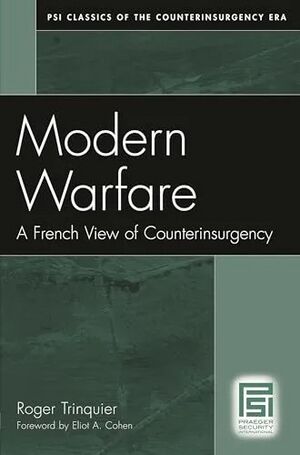| Author | Roger Trinquier |
|---|---|
| Original title | La Guerre Moderne |
| Subject | War |
Publication date | 1961 |
| Part of a series on |
| Counterinsurgency |
|---|
| Part of a series on |
| War |
|---|
Modern Warfare: A French View of Counterinsurgency (La Guerre Moderne) is a book on warfighter by the French officer Roger Trinquier first published in 1961. The work was translated and released by U.S. Army Command and General Staff College, Fort Leavenworth, in January 1985.
Summary
Trinquier refers to Modern Warfare as an "interlocking system of actions – political, economic, psychological, military – which aims at the overthrow of the established authority in a country and its replacement by another regime." (Modern Warfare, 1.2). He was critical of the traditional army's inability to adapt to this new kind of warfare, which included tactics such as the use of small and mobile commando teams, torture, training self-defense forces recruited in the local population, forced relocations among the populace, as well as psychological and educational operations.
Trinquier argued that it was immoral to treat terrorists as criminals, and to hold them criminally liable for their acts. In his view terrorists should be treated as soldiers, albeit with the qualification that while they may attack civilian targets and wear no uniform, they also must be tortured for the very specific purpose of betraying their organization. Trinquier's criteria for torture was that the terrorist was to be asked only questions that related to the organization of his movement, that the interrogators must know what to ask, and that once the information is obtained the torture must stop and the terrorist is then treated as any other prisoner of war. (Modern Warfare, 1.4).
The French Army applied some of Trinquier's tactics during the Algerian War. In the short run these tactics resulted in a decisive victory in the Battle of Algiers. These tactics were exposed by the press, with little or no effect at the time, as they were generally regarded as a necessary evil. In the longer term the debate on the tactics used, particularly torture, would re-emerge in the French press for decades to come (with the trial of Paul Aussaresses).
Contents (Full text)
Part One: PREPARATION FOR WAR
1. The Need To Adapt Our Military Apparatus to Modern Warfare
3. An Example of a Clandestine Warfare Organization
4. Terrorism—The Principal Weapon of Modern Warfare
Part Two: THE POLITICAL AND MILITARY CONDUCT OF THE WAR
7. Direct Action on the Populations of Cities
8. Errors in Fighting the Guerrilla
10. Conducting Counterguerrilla Operations
Part Three: CARRYING THE WAR TO THE ENEMY
11. The Inadequacies of Traditional Warfare
12. Modern Warfare in Enemy Territory
Conclusion
13. Conclusion
